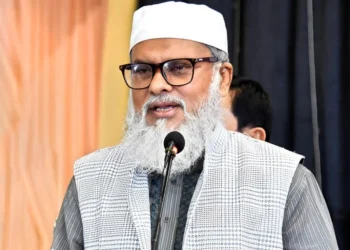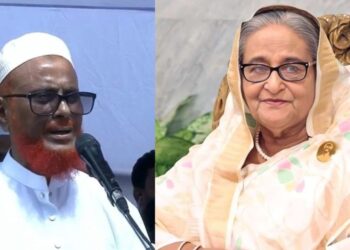1.Introduction
Dr Mohammad Yunus, a Bangladeshi economist, captivated the world by winning the Nobel Peace Prize for his groundbreaking work. He wasn’t recognized for brokering peace treaties, but for a powerful idea. Through his simple idea, the poorest people can change their lives if they are given a small loan or a chance to grow. “Grameen Bank” the institution was founded by Dr. Muhammad Yunus, made him a global icon as a pioneer of microcredit and the concept of “social business,” where companies focus on solving social problems instead of just making profits. Known as
The “Banker to the Poor,” because of he become a global symbol of innovation, compassion, and economic justice and revolutionized the world’s approach to poverty alleviation through the creation of microcredit and the establishment of Grameen Bank. He was developed the idea of social business, which is not for profit but to solve social problems like hunger, healthcare, and unemployment. Through his work not only several leaders but also several economists, and students around the world, and his name has appeared in TIME magazine’s list of the most influential people on the planet.
Years after his initial fame, Dr. Yunus’s name has once again taken center stage, not in the world of finance, but in the political landscape of Bangladesh, as he has recently been appointed the Chief Adviser of the country’s interim government. A role meant to ensure fair elections during political uncertainty, has sparked debate, hope, and criticism across the country.
2.The Making of a Visionary: Early Life and Education
Dr. Muhammad Yunus born on June 28, 1940,in a village called Bathua, near the city of Chittagong, which was then part of British India (now Bangladesh). He was born in a modest warm middle-class family, was the third child in a family of nine siblings. His father, Haji Muhammad Dula Mia Shawdagar, was a jeweler, and his mother was Sofia Khatun. Since childhood he was a simply a bright, curious boy, his mother known for her compassion and deep sense of empathy and later same empathy, quietly passed down, would later shape Yunus’s revolutionary approach to solving poverty.
2.1. A Childhood of Curiosity and Community
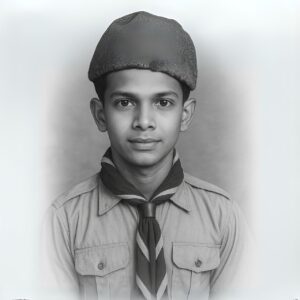
As Yunu’s family move in Chittagong 1944, he attended Lamabazar Primary School and later went to Chittagong Collegiate School, where he was a very bright student, even ranking 16th out of 39,000 students students in East Pakistan ( now Bangladesh). Since childhood, he was quit active and also a Boy Scout and even traveled to different countries like India in 1952, West Pakistan (now Pakistan), Europe, the USA, Canada in 1955 for attend Jamborees, the Philippines, and Japan for Boy Scout gatherings. He completed his BA in 1960 and MA in 1961 from the Department of Economics at Dhaka University.
2.2. After Graduation
After completing his graduation, his journey didn’t stop there he joined the Bureau of Economics at Dhaka University as a research assistant to economists Nurul Islam and Rehman Sobhan. In 1961, he appointed lecturer in economics in Chittagong College, also he set up a profitable packaging factory on the side.
In 1965, he earned a prestigious Fulbright Scholarship, allowing him to travel to the United States for higher studies and obtained his PhD in economics from Vanderbilt University through their Graduate Program in Economic Development in 1969. While studying abroad,(1969 to 1971) he also taught as an Assistant Professor at Middle Tennessee State University.
2.3. Bangladesh A Patriot with Purpose
During the Bangladesh Liberation War in 1971, Yunus felt a strong pull to return home. Yunus founded a citizen’s committee and ran the Bangladesh Information Center, with other Bangladeshis in the United States, to raise support for liberation. He also published the Bangladesh Newsletter from his home in Nashville. After the War, he returned to Bangladesh and was appointed to the government’s Planning Commission headed by Nurul Islam. However, he found the job boring and resigned to join Chittagong University as head of the Economics department. In 1974, that he became deeply aware of the crushing poverty around him, especially after witnessing the severe famine in Bangladesh.
In 1974, he became involved in poverty reduction and established a rural economic programmed as a research project and in 1975, he developed a Nabajug Tebhaga Khamar which the government adopted as the Packaged Input Programmed. For making the project more effective, Yunus and his associates proposed the Gram Sarkar programmed which is introduced by President Ziaur Rahman. Late 1970, the government formed 40,392 village governments as a fourth layer of government in 2003. On 2 August 2005, in response to a petition by Bangladesh Legal Aid and Services Trust (BLAST), the High Court declared village governments illegal and unconstitutional.
Read More: Tea in Every Hand: How a Simple Daily Habit Fuels a Thriving Economy
3.The Genesis of an Idea: The Birth of Grameen Bank

The world’s most revolutionary financial institutions trace back not to a polished boardroom, but to a modest village path in Jobra, near Chittagong University, Bangladesh is “Grameen Bank.”Grameen Bank is a microfinance which is specialized community development bank founded in Bangladesh, known as microcredit or “grameen credit” which is originated in 1976.
It’s main works is to provide small loans to the impoverished without requiring collateral. Muhammad Yunus, a professor at the University of Chittagong, who launched a research project to study how to design a credit delivery system to provide banking services to the rural poor. In October 1983, the Grameen Bank was authorized by national legislation to operate as an independent bank.
3.1. History of Grameen Bank
The history of Grameen Bank started because a kind-hearted economics professor named Dr. Muhammad Yunus saw a big problem that poor people especially village people couldn’t get loan from banks. They didn’t provide loaned because they think, it’s too risk to provide them loan as they hadn’t any land or valuable items. After saw this in 1974 Dr.Yunus while he was teaching in Chittagong University, he felt his classroom theories weren’t helping real people, so he went to a nearby village named Jobra. There he met a woman who was very skilled in bamboo stools but she was in the trap in the cycle of debt. Then Dr. Yunus realized that his village people weren’t lazy they just in a trap which is cycle of dept.
After that, in 1976, he used his own money for lent a total of US$27 to 42 women in Jobra and help them to buy their materials for making products. As a present they paid him back and this proved that even the poorest people were trustworthy and could manage small loans. After the success he understood that he needed to do something for this people and tried to convince big banks to follow his lead.
But they didn’t agree his proposal and also have several trust issues, they couldn’t imagine lending without collateral. Then he proved Rabindranath Tagore those lines, “যদি তোর ডাক শুনে কেউ না আসে তবে একলা চলো রে। (“If no one responds to your call, then go your own way alone”)” and decided to create his own banking system, started a small “action research project” with the University of Chittagong and a national bank, testing his idea on a bigger scale. On October 2, 1983, the Grameen Bank which means “Village Bank” in Bengali was officially created as an independent bank.
3.2. How Grameen Bank Work
Grameen Bank was special because it operated on new rules:
•No Collateral: Poor people didn’t need anything valuable to offer as security for a loan. They were trusted.
•Focus on Women: Most loans went to women because they were found to be more reliable in paying back loans and tended to use the money to improve their families’ lives.
•Small Loans (Microcredit): The loans were tiny, just enough for someone to start a small business, like buying a sewing machine, a cow, or materials for handicrafts.
•Group Lending: Borrowers formed small groups (usually of five). While each person was responsible for their own loan, the group members supported each other. If one person struggled, the others would help, creating a strong bond and encouraging everyone to repay.
•Weekly Meetings: Bank staff would go to the villages and meet with borrowers weekly. This made it easy for borrowers to repay small amounts and discuss any issues.
3.3. Impact and Global Recognition
Grameen Bank helped millions of families improve their lives, build small businesses, and send their children to school. In 1994, Grameen Bank received the Independence Day Award, which is the highest state award of Bangladesh. In 2006, the world recognized this incredible achievement, Dr. Muhammad Yunus and Grameen Bank were jointly awarded the Nobel Peace Prize for their efforts to create economic and social development from the ground up.
On 10 December 2006, Mosammat Taslima Begum, who used her first 16 euro (US$20) loan from the bank in 1992 to buy a goat and subsequently became a successful entrepreneur and one of the elected board members of the bank, accepted the Nobel Prize on behalf of Grameen Bank’s investors and borrowers at the prize awarding ceremony held at Oslo City Hall.
4.Champion of Social Business: Beyond Microcredit
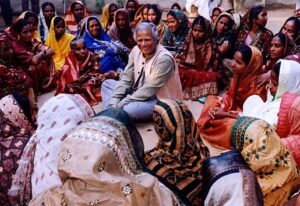
After changing the world with microcredit and the success of Grameen Bank,Dr. Muhammad Yunus, a Nobel Peace Prize laureate, is renowned for pioneering both microcredit and social business. His vision for helping society goes much further than just money lending. He’s also a big champion of something he calls “Social Business.”
4.1.What Is Social Business?
Social business is a company that is created not to make profit for owners, but to solve a social problem. Yunus defined social business as a non-loss, non-dividend company designed to address a specific social problem. Mainly social business works like, sells products or services like any regular business, it makes money but instead of giving profits to shareholders, it reinvests everything back into the business to grow and help more people, the goal is not to make the rich richer, but to make society better.
Yunus has established various social businesses under the Grameen brand, including ventures in mobile phone services, student loans, healthcare, and food production. Yunus’s “Three Zero” concept zero poverty, zero unemployment, and zero net carbon emissions, outlines his vision for a sustainable future through social business.
4.2. What is “Triple Zero” concept?
The “Triple Zero” concept, primarily championed by Muhammad Yunus, refers to a vision of a world with zero poverty, zero unemployment, and zero net carbon emissions. The “Three Zeros” concept aligns with several Sustainable Development Goals (SDGs) adopted by the United Nations.
It offers a holistic approach by recognizing the interconnectedness of these three issues and suggesting that progress in one area can contribute to progress in others. In one sentence, the “Triple Zero” concept provides a powerful vision and framework for building a more just and sustainable world.
•Zero Poverty: This aims to eliminate extreme poverty and ensure everyone has access to basic necessities like food, shelter, and healthcare.
•Zero Unemployment: This envisions a world where everyone who wants to work has the opportunity to find meaningful employment, potentially through promoting entrepreneurship and social businesses.
•Zero Net Carbon Emissions: This focuses on mitigating climate change by transitioning to a sustainable energy system and reducing greenhouse gas emissions to net zero.
4.3. Social Business Beyond Microcredit
A social business as a business which created and designed to address a social problem that will be a non-loss, non-dividend company. Yunus is widely recognized as the “father of microcredit” for his work in providing small loans to impoverished individuals, primarily women, to start businesses and improve their lives. Yunus views access to credit as a fundamental right that empowers individuals to improve their lives.
He believe that social business, unlike traditional charity, offers a sustainable path to poverty alleviation by enabling self-reliance and economic empowerment. Yunus encourages investors to view social businesses as viable investment opportunities with a dual focus on financial returns and social impact.
4.4. Yunus’s Social Businesses
•Grameen Danone: This company, partnered with the big food company Danone, makes special yogurt with nutrients to help reduce malnutrition (when people don’t get enough good food) in children in Bangladesh.
•Grameen Veolia Water: As mentioned, this partnership provides clean, affordable drinking water to villagers.
•Grameen Eye Care: Aims to provide affordable eye care and cataract surgeries to prevent blindness among the poor.
5. Criticism and Controversy: Other Side of The History
As every story has many sides, Dr. Muhammad Yunus journey is not different from others. While he celebrating worldwide for his role in creating Grameen Bank and introducing microcredit to millions, there have also been moments of criticism, debate, and controversy around his work, especially within Bangladesh.
Read more: Starlink in Bangladesh: A New Era for Digital Inclusion and Economic Growth
5.1.Criticisms of Microfinance (Grameen Bank)
Grameen Bank, while lauded for its impact on poverty reduction, faces several criticisms. One common criticism is about the interest rates charged by Grameen Bank and other microfinance institutions. Critics argue that even though Grameen’s rates are much lower than local moneylenders, they can still be high for the very poor, sometimes causing them difficulty in repayment. Yunus and his supporters counter that their rates are transparent and much fairer than the often exploitative rates charged by traditional informal lenders. Another concern has been the pressure on borrowers.
While the group lending model is designed for support, some critics suggest that it can also create intense peer pressure for repayment, which can be very stressful for individuals, especially if their small business ideas don’t work out as planned. Some also argue that microfinance, while helpful for individuals, doesn’t always address the root causes of poverty, like a lack of education, healthcare, or large-scale job opportunities.
5.2.Disputes with the Bangladeshi Government
The most significant controversies for Dr. Yunus have come from his long-running disagreements with the Bangladeshi government, particularly ex-Prime Minister Sheikh Hasina. Many observers believe these disputes were politically motivated.
•Removal from Grameen Bank (2011): In 2011, the ex-government of Bangladesh Sheikh Hasina removed Dr. Yunus from his position as Managing Director of Grameen Bank. The official reason given was that he was past the legal retirement age (60 years old), even though he was 70 at the time and the bank’s rules for its founder were seen as different. His supporters and many international figures saw this as a political move by the ex-government to gain control over Grameen Bank and Dr. Yunus’s influence, as he was seen as a potential political rival. Sheikh Hasina herself publicly accused him of “sucking blood” from the poor and treating Grameen Bank as his “personal property,” but Dr. Yunus strongly denied this allegation. After his removal, Dr. Yunus faced a barrage of legal cases. These included charges related to:
•Labor law violations: Allegations that companies he founded, like Grameen Telecom, didn’t properly set up welfare funds for their workers. In January 2024, he and three others were sentenced to six months in jail for this, though they were immediately granted bail.
•Financial irregularities: Accusations of tax evasion, embezzlement, and misusing funds from some of his social businesses.
Dr. Yunus and his legal team consistently stated that these charges were “meritless, false, and politically motivated,” designed to harass and humiliate him. Many international leaders and Nobel laureates also spoke out, condemning what they called “continuous judicial harassment.”
•Allegations of Political Vendetta: The repeated nature of the accusations and the strong language used by the former Prime Minister against him led many to believe there was a personal and political vendetta. Some analysts suggest that Hasina viewed Yunus as a threat due to his global popularity and independence. His brief attempt to form a political party in 2007 might have also contributed to this perception, even though he quickly dropped the idea.
6. Adviser to the Nation: Dr. Muhammad Yunus and the Caretaker Government Chapter
Dr. Yunus known as the “Banker to the Poor,” has had two notable moments stepping into the political spotlight in Bangladesh, even though for most of his life, he focused on his economic and social work. The history from 1996 to 2024, Muhammad Yunus’s history includes his role in the 1996 caretaker government, his involvement in civil society movements, and his appointment as Chief Advisor of Bangladesh in August 2024 following a student-led uprising.
6.1. Dr. Yunus in 1996: Service as Government Advisor
In 1996, Dr. Muhammad Yunus served as an advisor to the Caretaker Government of Bangladesh. This was a temporary government formed to oversee fair general elections. Khaleda Zia of the Bangladesh Nationalist Party (BNP) was elected as Prime Minister of Bangladesh for the first time by the 1991 general election. She was elected again in the following February 1996 general election.
The election was organized by Zia’s government rather than a neutral caretaker government and was boycotted by the major opposition parties − the Awami League, Jatiya Party and Jamaat-e-Islami. Without major competition, the BNP won a landslide victory and Zia was re-elected. The opposition demanded new elections under a caretaker government. Civil unrest led to these demands being met in late-March and an Awami League victory in the June 1996 general election. On 28 March, the 13th amendment to the Constitution of Bangladesh introduced the practice of non-partisan caretaker governments for the holding of general elections.
Yunuse was responsible for overseeing several key ministries:
•Ministry of Primary and Mass Education: This role would have involved policies related to basic education for all citizens.
•Ministry of Science and Technology: Focusing on the advancement and application of science and technology in the country.
•Ministry of Environment, Forest and Climate Change: Dealing with critical issues like environmental protection, forestry, and addressing the impacts of climate change.
6.2. Bangladesh Political Crisis (2006-2008) and Caretaker Complications
In Bangladesh, there was a system, before a general election, the elected government would step down. Then, a neutral, non-political “caretaker government” would take over temporarily, usually for about three months. Their main job was to manage the day-to-day running of the country and, most importantly, to ensure that the upcoming election was free and fair, without any influence from the outgoing political party. The head of this caretaker government was called the Chief Adviser, often a retired Chief Justice.
This system was put in place in 1996 because the major political parties, the Awami League (AL) and the Bangladesh Nationalist Party (BNP), deeply distrusted each other and believed that the party in power would rig the elections.
The crisis began in October 2006 when the BNP-led government, headed by Prime Minister Khaleda Zia, ended. According to the system, a caretaker government should have taken over smoothly. However, things quickly went wrong:
•Dispute over the Chief Adviser: The biggest problem was the appointment of the Chief Adviser for the caretaker government. The Awami League (AL), then in opposition, accused the outgoing BNP government of trying to manipulate the system to appoint someone who would favor them. There were allegations that the BNP had unconstitutionally increased the retirement age of the Chief Justice to ensure their preferred candidate would become the Chief Adviser.
•Widespread Protests and Violence: This dispute led to massive, often violent, protests by the Awami League and its allies. Streets became battlegrounds, with clashes between rival political groups and the police. Many people were injured and killed during these protests, notably the “Logi Boitha Andolan” (Boat-hook and Oar Movement) that marked intense street violence.
•President Iajuddin Ahmed Takes Charge (and Crisis Deepens): With no agreement on a neutral Chief Adviser, the responsibility fell to the President, Iajuddin Ahmed, to take on the role himself in October 2006. However, he too faced heavy criticism for being seen as biased towards the BNP. The political situation became extremely unstable, with boycotts and threats of more violence if elections were held under his leadership.
•Emergency Declared and Military Intervention (January 2007): As the scheduled general election in January 2007 approached, the Awami League and its allies announced they would boycott it, arguing that it wouldn’t be fair. Facing widespread violence and the threat of a complete collapse of law and order, the military stepped in. On January 11, 2007, President Iajuddin Ahmed declared a state of emergency, cancelled the upcoming elections, and resigned as Chief Adviser.
In January 2007, there was significant speculation and reports that, the army leadership, particularly Army Chief General Moeen U. Ahmed, had offered Dr. Yunus the position of Chief Adviser for this interim government. Dr. Yunus reportedly declined this direct offer to lead the military-backed caretaker government. While he generally supported the idea of cleaning up politics, he seemed hesitant to directly lead an administration that came to power through non-electoral means, even if it aimed to be neutral.
In February 2007, he announced his intention to form a new political party called “Nagorik Shakti” (Citizens’ Power). His stated goal was to bring a new kind of politics to Bangladesh, one free from corruption, focused on good governance, and not based on the traditional, confrontational party system. He wanted to offer a “clean” alternative to the two political parties (Awami League and BNP).
He even wrote open letters in newspapers, asking citizens for their ideas and support for this new political movement. However, this political venture was very short-lived. By May 2007, Dr. Yunus announced that he was abandoning his plans for Nagorik Shakti. He cited a lack of suitable, interested candidates and sufficient public support for his vision of a new political party. Many observers believe he realized that direct involvement in Bangladesh’s rough-and-tumble politics was not for him, or that the practical challenges were too great.
•Military-Backed Caretaker Government (Fakhruddin Ahmed): The military effectively installed a new caretaker government, with Fakhruddin Ahmed (a former World Bank official) as the new Chief Adviser. This government, often referred to as the “1/11” (January 11) government, was seen as being heavily backed by the powerful army chief, General Moeen U. Ahmed.
•“Minus Two” Formula and Anti-Corruption Drive: This new caretaker government was different. It operated under a state of emergency for nearly two years, much longer than the constitutionally allowed 90 days. It launched a widespread anti-corruption campaign, arresting many prominent politicians, including both Sheikh Hasina (Awami League) and Khaleda Zia (BNP), who were leaders of the two main parties. There was widespread speculation that the government intended to push these two long-standing rival leaders out of politics permanently often referred to as the “minus two” formula to bring stability to the country.
•Return to Democracy (2008): After nearly two years of emergency rule, and facing international pressure, the military-backed caretaker government eventually prepared for and held new national elections in December 2008. The Awami League, led by Sheikh Hasina, won a landslide victory, marking the end of this complicated and often controversial caretaker period.
7. The Journey of Become Chief Advisor of Bangladesh

For many years, Dr. Yunus was known globally as the “Banker to the Poor” and a Nobel Peace Prize winner, but he largely stayed away from direct political power in Bangladesh, despite some past offers. His relationship with the previous government, led by Prime Minister Sheikh Hasina, was often strained, marked by legal battles and public disagreements.
7.1. The Student-People’s Uprising (July-August 2024)
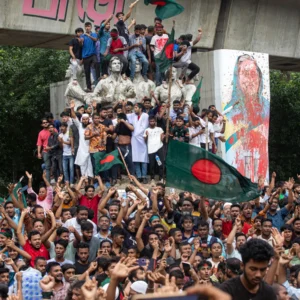
The journey of protesting across Bangladesh. These protests, which started in July 2024, were initially led by students demanding reforms to the government job quota system. However, the movement quickly grew much larger, turning into a nationwide “Student-People’s Uprising” against the government itself.
People were unhappy about various issues, including alleged corruption, lack of justice for previous deaths, and what they saw as an increasingly authoritarian government. The protests became very intense, with large crowds taking to the streets, clashing with police and government supporters. There were many injuries and sadly, many lives were lost during the unrest. The situation became very unstable across the country.
7.2. The Government’s Resignation
As the protests reached a peak in early August 2024, the pressure on the government. On August 5, 2024, facing an overwhelming public outcry and a complete breakdown of law and order, Prime Minister Sheikh Hasina resigned from her position and left the country. This left Bangladesh without a prime minister or a functioning government. With the government gone, Bangladesh faced a major leadership crisis.
There was no clear path forward according to the constitution for an immediate transfer of power. In this critical moment, discussions began involving the President, top military officials, and importantly, the student leaders who had led the uprising. The student movement coordinators strongly pushed for a civilian-led interim government, firmly against any military takeover. They needed a leader who was respected by everyone, neutral, and had a strong international reputation.
7.3. Dr. Yunus’s Nomination and Acceptance
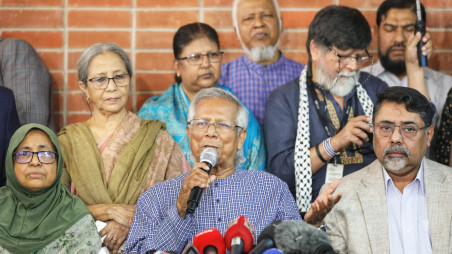
It was the coordinators of the student movement who first proposed Dr. Muhammad Yunus’s name to lead this interim government. His Nobel Peace Prize, his long history of working for the poor, and his image as someone outside traditional politics made him an ideal choice to bring trust and stability during a difficult transition. At the time, Dr. Yunus was actually in Paris for a medical procedure.
When he was contacted by the student leaders, he initially hesitated, citing his other commitments and his age. However, the students kept urging him, reminding him of the immense sacrifices people had made during the protests. He later said that he felt a responsibility to the students and the nation who had fought so hard for change. He agreed to take on the challenging role.
7.4. Swearing-In as Chief Adviser (August 8, 2024)

After his acceptance, the legal steps were quickly taken. On August 8, 2024, Dr. Muhammad Yunus returned to Bangladesh and was formally sworn in as the Chief Adviser of Bangladesh by President Mohammed Shahabuddin at the Bangabhaban (President’s official residence). Along with him, an advisory council (like a temporary cabinet of ministers) made up of other neutral and respected individuals was also formed. His appointment marked a historic moment, bringing a globally recognized humanitarian to lead a nation in transition, with the immediate goals of restoring peace, undertaking necessary reforms, and preparing for free and fair elections.
7.5.Economic Affairs
When Dr. Yunus’s interim government took over, Bangladesh’s economy was already facing difficulties. These included:
•High Inflation: Prices for everyday goods were rising fast, making life hard for ordinary people.
•Banking Sector Issues: There were problems within the banking system, including bad loans.
•Low Foreign Reserves: Bangladesh didn’t have enough foreign currency, which made it harder to import goods.
•Job Losses: The political unrest that led to the change in government caused many businesses to slow down or close, leading to people losing their jobs, especially women.
As government, he fullfill his all duties and still now he is giving his best. Because of him not only several sectors but also change full situation of Bangladesh. As,
•Tackling Corruption: A big focus has been on investigating corruption from the previous government. They set up committees to look into how much money was illegally taken out of the country.
•IMF Loan Management: They’ve been working to secure important loan payments from the International Monetary Fund (IMF) by agreeing to certain economic reforms.
•Stabilizing the Economy: Efforts have been made to control inflation and bring back some stability, although it’s a huge challenge.
•Trade Revival: The government has tried to boost trade and investment, including resuming trade relations with Pakistan after decades and seeking more investments from countries like China.
Despite efforts, the economy is still recovering from the impact of the protests and past issues. Job creation remains a big concern, and attracting new foreign investment takes time, especially with political uncertainties.
7.6.Foreign Affairs
Dr. Yunus’s background as a Nobel Peace Prize winner and a globally respected figure has given Bangladesh a unique advantage in foreign policy. He’s been using his personal reputation to rebuild and strengthen Bangladesh’s ties with the rest of the world.
As a responsible government Yunus has done:
•“360-Degree Diplomacy”: This means reaching out to countries in all directions – East, West, North, and South – rather than focusing too heavily on just one or two partners.
•Meeting World Leaders: Dr. Yunus has traveled to many countries, including the U.S. and China, and met with powerful leaders like President Joe Biden and Prime Minister Narendra Modi. These meetings aim to explain Bangladesh’s transition, seek support, and attract investments.
•Rebalancing Relations: The government is working to have more balanced relationships with major global powers. For example, they’ve increased engagement with China, securing significant loans and investments, and also revived ties with Pakistan.
•Clarifying Bangladesh’s Situation: A key goal has been to assure the international community that the recent changes in Bangladesh were due to internal public demand, not outside interference.
7.7.Criticism (General)
While Dr. Yunus initially enjoyed widespread public goodwill, his interim government has started to face various criticisms, as
•Slow Progress on Reforms: Critics argue that the ambitious reform agenda (like changes to the election system, police, and bureaucracy) is moving too slowly. People are impatient for clear changes.
•Uncertainty on Election Date: A major source of criticism is the lack of a firm date for the next general election. While Dr. Yunus has said it will be by June 2026 after reforms, some political parties and even the military are pushing for an earlier date, leading to a “trust deficit.”
•Perceived Bias: Some political groups accuse the interim government of favoring certain parties, particularly the student-led groups, or being harsh on the previous ruling party (Awami League) without equal scrutiny of others.
•Controlling State Organs: There are concerns that some parts of the government, like the police and civil service, are still not fully under the control of the interim administration, making reforms difficult.
•Threats of Resignation: Dr. Yunus himself reportedly considered resigning in May 2025, expressing frustration that political parties and other institutions were not cooperating enough to allow the government to function effectively and carry out its reform agenda.
7.8.Criticism over Management of Ministry of Foreign Affairs
While Dr. Yunus’s personal efforts in foreign policy are widely praised, there have been some specific criticisms or observations regarding the management of the Ministry of Foreign Affairs under the interim government:
•Over-reliance on Chief Adviser’s Persona: Some suggest that while Dr. Yunus’s global fame is a huge asset, the foreign policy might be too reliant on his individual trips and meetings. There could be concerns about the long-term strategic direction and the day-to-day effectiveness of the Ministry itself, beyond the Chief Adviser’s personal diplomacy.
•Inexperience of Some Advisors: The interim government appointed advisors (ministers) based on their non-political, expert backgrounds. While this brings fresh perspectives, some might lack deep experience in the intricate workings of a foreign ministry and international diplomacy, leading to potential challenges in coordination or execution.
•Policy Shifts and Reactions: The government’s shifts in foreign policy, such as the increased engagement with China and a stronger stance against “Taiwan independence,” have been noted. While these are policy decisions, they can sometimes draw criticism or concern from other international partners who might see them as a departure from past stances or a tilt towards certain global powers. For instance, increased engagement with China might raise eyebrows in Western capitals.
•Handling of Specific Issues: Like any government, the interim administration faces criticism for its handling of specific foreign relations issues. For example, some human rights groups have called for stronger action from India regarding certain incidents in Bangladesh, criticizing India’s continued engagement with the interim government, arguing it legitimizes an “unconstitutional” setup.
8. Conclusion
In the history of Bangladesh,2024 is a new revolution for this country people. Dr. Muhammad Yunus is the who is from a visionary economist who revolutionized poverty alleviation through microcredit and social business to an unexpected political leader at a pivotal moment for Bangladesh. He started as a quiet economics professor but became famous worldwide for giving small loans, called “microcredit,” to poor people who couldn’t get help from big banks.
His concept of “social business” further extended his vision, showing how market forces could be harnessed to solve societal problems without prioritizing personal profit. All this journey was not so much easy for him. He faces several arguments and cases. As Chief Adviser, following the dramatic popular uprising of 2024, is a testament to his enduring moral authority and the public’s trust in his neutrality.
His effort in every sector taking Bangladesh in a new revolution and the day-to-day management of diplomatic shifts also draws scrutiny. His journey underscores the power of ideas to transform societies, but also the formidable complexities of translating those ideas into stable and just governance, especially in a nation grappling with its own tumultuous past and uncertain future.
Reference
Wikipedia
Time Magazine
Al Jazeera
World Bank
Un-Habitat
Boston Consulting Group
Grameen Bank
Grameen America
Globalorder
Yunus Centre
PBS
The Financial Express
Human Rights Watch
Daily Observer
Crisis Group
The Economic Times
Asia Society
Refworld
The Hindu
The Daily Star
The Business Standard
Daily Sun
NDTV










